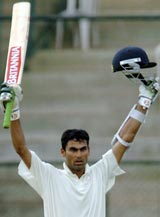
|

His first Test hundred down, Kaif's taken nothing for granted
© Getty Images
|
|
He might have produced his highest first-class score but Mohammad Kaif better be on his toes. The joke is that Kaif usually gets dropped after crucial knocks. Despite having an impressive series against Australia at home, where he ended as the third highest run scorer, he was dispensed with; his crucial 91 against England at Nagpur, when he helped India draw the match, was rewarded with an axe. To date, he's played two Tests in a row only twice. It's probably a situation where nobody can be really blamed; even though he scores runs as a replacement, he still remains just that - a replacement.
But why has Kaif never cemented a permanent spot in the side? There are reasons and then there are reasons. In over nine years of first-class cricket, he has just six centuries and has never been the sort of batsman who was associated with regular big ones. Also, his highest first-class score was 136, relatively modest considering the manner in which runs are piled on in domestic cricket in India. While batsmen like Wasim Jaffer, who passed 150 for fun, are bound to always be in contention, Kaif was more the utility cricketer, someone who would chip in but never take off. Added to that, since that glorious day at Lord's in 1996 - when Sourav Ganguly and Rahul Dravid made their spectacular debuts - aspiring to squeeze into India's middle order was almost a pipedream. Several turned into openers, others even tried wicket-keeping; there was just no place.
Kaif's advantage was being spotted early. Ever since the Under-15 levels, he was picked out as a batsman for the future, and was even touted as a future Indian captain. Yet, as he himself admitted at the end of a special day, it's taken him time to "understand" his game. "It took me four to five years to learn about my own game," he said. "It helps when you know how you're going to score runs. I've learnt that in my career, about how to be smart and plan your game, handle conditions, handle pitches."
Unlike a few others, though, Kaif knows no silver spoon. He has had to battle hard for a place in the side, return to domestic cricket and constantly stake his claim. "In life, there are good times and bad times. It's how you learn through experience. It's been a good learning process for me. And as soon as you learn the lessons, it is much quicker. It's important to make up for your bad days by cashing in on the good days."
Does he worry about which position he bats, whether this innings will guarantee him another innings at all? "You can't afford to think about your position, that you won't be getting a chance in the starting XI. I don't think one can afford to think about getting dropped. It's something not in your control. I've been asking the same question for the last couple of months and years, but it's something not to think about. The captain and coach know which position is the best to bat. It's important to just watch the red ball and prepared to take it ball by ball."
Kaif would know the importance of cashing in, especially when he was offered a flat deck against an attack that was largely first-class. He preferred to bide his time early on, managing only one four in his first 71 balls, but picked it up once he was well set. Dravid's assurance at the other end would have surely helped; as would the lollypops that Ramnaresh Sarwan and Chris Gayle offered now and then. Kaif brought up his hundred off a rank full toss from Sarwan, who was probably riding his luck too far after getting Dravid with a most innocuous half tracker.
It was undoubtedly special. "Scoring a hundred in a country where there is so much passion for cricket, where they know their cricket so well, is definitely special. There has been a lot of support for India in both the one-day and Test series and it's nice to play with such a good atmosphere ... I'm glad I could get a big one here. My Test career has been on and off. I got 91 against England but couldn't convert that innings into a big score. My performance has been up and down. When you have the confidence going, you need to convert 50s into big scores. I've been feeling good over the last couple of weeks. My responsibility to keep batting like that, getting more such scores."
He might have strengthened India's position considerably, but Kaif warned that India's job was only half done. "It's not a sort of wicket where you can get the opposition out in quick time. You need to bowl patiently and set fields that get the batsmen to make errors. We need to be patient to get our wickets. We've got a good start. Two days have gone well. But to win a Test, we need to do well in the next three days."
St Lucia has a long history of see-saw battles - it changed hands between the British and French as many as 14 times before the former finally took control in 1814. India will know that they have a long battle ahead. They will also know that, at the moment at least, they are more British than French. By a long way.
Siddhartha Vaidyanathan is staff writer of Cricinfo

